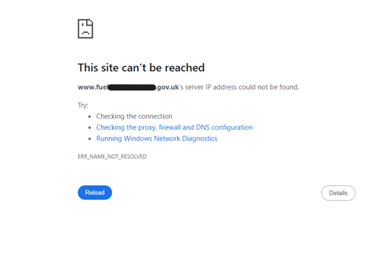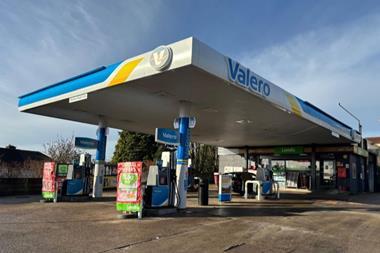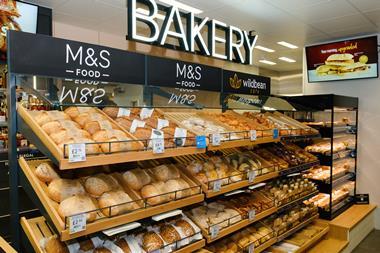With most tanks and pipework buried underground it is tempting to just ignore them, but more and more dealers are taking a concerned interest in the health of their systems because the financial penalties if they fail can be fatal for a business. If any fuel leaks into the environment, firms can face unlimited fines and, at the very least, a huge bill and long closure while the mess is cleaned up. And with forecourt sites also becoming much sought-after real estate, any contamination will knock a huge amount off the value of the asset.
For these reasons dealers, and the biggest players in the forecourt sector, are all looking nervously at any single-skin tanks one major oil company has more than 1,000 single-skinned tanks in its network, and one supermarket group has more than 650 and many are opting to reline them or are investing in new tanks.
"The dealer market is now more understanding that investment in tanks and pipes is essential for the success of the business," explains Paul Muncey, head of network sales retail, at Certas Energy. "Of the new business and re-signs to the Gulf brand in the past six months, a large percentage include a financial contribution towards pumps, tanks, pipework and development. The health and safety consequences alone of inaction can threaten the existence of an otherwise thriving business. Add to that the cost and upheaval of putting things right, product loss over a sustained period and the reputational damage. The potential risks and cost implications of doing nothing are too great to contemplate.
"Most dealers recognise this and also understand the potential revenue growth that can be achieved by increasing underground tank flexibility to meet the changing demands of the motorist, including more pumps dispensing higher margin performance fuel grades.
"Gulf’s premium fuel brand, Endurance, is consistently accounting for over 20% of forecourt revenues and providing Gulf dealers with a welcome boost to their forecourt profits. Certas Energy implements a real-time wet-stock management programme along with regular pump and tank testing across its company estate, and we encourage all Gulf dealers to do the same. I cannot overstate the value of real-time wet-stock management. Wet-stock loss is potentially the third largest cost drain on a forecourt and the pay-back from working with companies such as Fairbanks, Vianet and Suresite to manage stock can be pretty much immediate."
Steve Devine, installations and projects manager at Tokheim Solutions, says the company can handle all aspects of tanks and pipework. If it is a new site it can provide a turnkey operation from inception through to completion and can use its own directly employed construction team. He says: "We can install new tanks and pipework, single skinned or double-skinned. We can maintain any existing tanks and pipework and test them, or demolish them if they are going to be changed. We dig out the old tanks, and get rid of the old pipework, and if there is any contamination we can put in a range of measures to deal with that."
While some dealers are opting to prolong a tank’s life by lining them, he says there is a lot of investment in new tanks. This is being driven by two factors: companies wanting to replace older single-skin tanks, but also because they want to install larger tanks. He says: "Now, with bottom-loading tankers and 38,000-40,000-litre deliveries, it becomes very cost inefficient to take small deliveries to small tanks. What often happens is they will fill the smaller existing tanks with foam or concrete and then have an area to put a new tank in."
Modern methods have also made the process much more straightforward. Devine says: "From the installation point of view, things have got a lot simpler because you now have tanks that are properly coated and are protected with interstitial monitoring. And we can install them so they can be taken out of the ground at a later date. If there is a high water table we might have to put them in concrete, but generally we excavate and create a concrete base, put the new tank in, and then back fill with pea shingle and cap it with concrete. If you ever needed to move it you could break off the top concrete layer and take the tank out because the back fill is just surrounding the tank and is not concreted in position."
Tokheim Solutions can also provide a lining option. Andy Wallace, UK operations manager, says the company recently obtained approval to use its PVC bag-lining system for unleaded tanks in the UK. The system, in which a prefabricated bag is inflated inside a tank, won UK approval for diesel two years ago and has already been installed in six UK tanks since then. Following the approval for use with unleaded petrol, Wallace says: "We’ve started a project to do two tanks for one of the major oil companies as a pilot. We’ve got the order, we’ve measured up for them, and the bag is now being manufactured."
He says the primary benefit of the system, from the point of view of Tokheim and its customers, is that all the installation work can be done from above ground, removing the hazards and safety requirements associated with having staff inside the tank. He adds: "Another big advantage is the speed and ease with which an installation can be done. Typically a tank can be done in a day and in the vast majority of cases the site can stay trading on all its other tanks. This compares with a standard man-entry system where sites usually experience closures that can run into weeks. Because the risk factor of someone working in the tank is removed, we can cordon off parts of the forecourt to allow access to the tank we are working on, but not have to cover up and stop operations from other pumps."
Eurotank has also recently launched a flexible liner the Fastliner that is ATEX-approved for both petrol and diesel tanks and has installed them at a site for the first time. Eurotank group managing director, Ed Wheeler, says conventional tank-lining processes can require closure of a site for up to a month, but with the Fastliner process Eurotank was able to keep petrol and diesel on sale throughout the 14-day project.
Eurotank’s procedure involves manned entry of the tank, but Wheeler says this is important to patch up any weak points in the tank before installation, as the flexible liners rely on the host tank being tight so a vacuum will hold them in place. The company also uses its own entry containment system, which means engineers can work on one tank at a time while the rest of the forecourt is still open for business.
Once the liner is installed an intelligent interstitial monitor detects any changes in the vacuum holding it in place. It can distinguish between whether changes in the vacuum are due to the flexible liner moving as the volume of fuel in the tank changes or whether it is a leak.
Wheeler says the new system would not be viable without Eurotank’s Calibex 3D laser tank calibration system for mapping the internal dimensions of tanks. Without Calibex, tanks would have to be emptied and a technician would have to enter it to take the measurements for the liner, but Calibex enables measurements to be taken without entering the tank and while it is still in use and up to 30% full.
Another major player in the tanks and pipeworks sector, Vianet Fuel Solutions, has undergone major changes in its ownership. At the end of 2015 it was bought by US multinational Wayne Fueling, and then Wayne was bought by another US company, Dover, with that deal receiving approval in mid-December 2016.
Sales and marketing director Phil Prow says the company still offers the same range of tanks and pipework services and has a very strong order book well into 2017.
Throughout 90 years of growth, Adler & Allan says it too has developed into a company that can provide a total tank and pipework service, from installation or removal, to the maintenance that is essential to ensure the quality of fuel and prevent leakage. It also reminds dealers that one of the most basic security requirements for tanks is ensuring that thieves cannot access their valuable fuel, and it currently provides locking devices to more than 600 sites in the UK, including ones owned by the major oil companies and sites owned by the large supermarket groups.
Problems with biofuels
DP Fuel Tank Services’ (DP FTS) has a strategic alliance with expert companies to assist forecourt operators in tackling the problems caused by the introduction of biofuels. "While governments and pressure groups continue to argue about whether or not biofuels are a good thing, it is the fuel sector that is left to sort out the problems," says Nigel Plumb, managing director of DP FTS.
He says biofuels can lead to the growth of algae and bacteria, clogging filters and engines. It also corrodes steel and eats polymer seals. To help retailers deal with these and other issues in a practical way, DP FTS has drawn up an easy-to-understand, 10-point advice sheet. The document approaches the problems step by step, starting with symptoms and simple actions, and only progressing to tank cleaning and fuel polishing as a last resort.
The advice sheet also looks at how to keep biofuel problems at bay through regular testing, whether there is an apparent problem or not. Sometimes problems are not obvious by eye alone.
A test will show just what problems there are and their extent. It will also establish a base line against which to judge the effectiveness of any remedial work that may have to be carried out.
Plumb says as well as testing for particles and bio-contamination, it is worth testing the specific gravity of the fuel. Normally, water in the fuel is reasonably obvious, but biofuel absorbs water and masks the problem. Often, the only indication is a change in the density of the fuel.
He says it is also vital to have a clean tank when dealing with biofuel. DP FTS’s experience has shown that removing the fuel and thoroughly cleaning all sediment from the tank will cure a clogging problem caused by sediment. It will also remove bacterial colonies and algae clinging to the inside of the tank or in the residual sludge. While the tank is empty and clean, it can be checked for leaks and thinning, both by eye and by ultrasound probe and this is also a good time to get the tank lined.
For any other technical problems DP FTS can bring in other specialist companies.
Plumb says: "We see ourselves as a solutions provider and many of the projects we are called in for these days require a multi-disciplinary approach, with all the tasks requiring a high level of experience and expertise if they are to be carried out efficiently and, above all, safely.
"Rather than trying to become a jack of all trades, we decided to conclude joint working agreements with companies we know have the right level of training, expertise and experience and will give our customers the high level of service they have come to expect from us."



























No comments yet